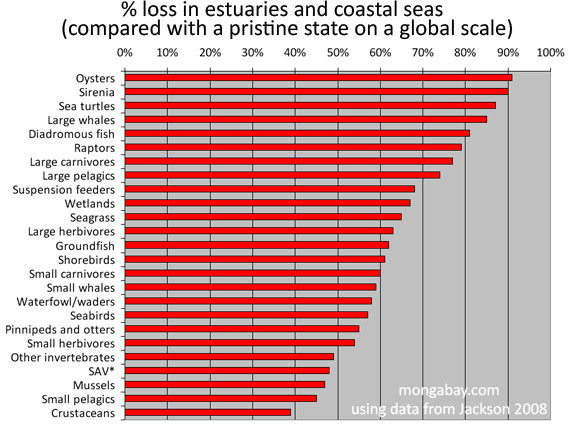The U.S. is the world's third largest consumer of seafood after Japan and China. In 2007 the U.S. ate almost 5 billion pounds of seafood alone, 85 percent of which was imported. The 5 billion pounds does not include the amount of by-catch�target fish that is too small, non-target fish, sharks, dolphins, marine turtles, seals�that is caught and discarded.
According to Jackson's paper, stocks of predatory fish � including tuna, salmon, cod, swordfish, and rays � have been diminished by 90 percent since the 1950s. In the Northern Atlantic popular dinner items such as cod, pollack, and haddock�all predatory fish�have dropped by 89 percent in a century, leading to a deep decline of the fishing industry in this region. Yet still such species are fished. Both northern and southern bluefin tuna are considered critically endangered, yet are heavily caught. The decline of sharks has occurred even faster, a study in the Northwest Atlantic showed that population declined 40 to 89 percent in just fourteen years. Sharks are caught both for consumption and as bycatch.

This widespread decline of marine predators has lead to what is called a trophic cascade, wherein the loss of top predators causes population changes down through the food chain. The example Jackson presents is the loss of sharks in the Northwest Atlantic. This led to a rapid rise of the cownose ray, which number now at about 40 million. The ray feeds on oysters and clams and its population explosion has resulted in the collapse of clam fisheries. A trophic cascade can run all the way down a food chain, leading to drops in zooplankton and rises in phytoplankton, changing the ecosystem entirely.
It's not just predatory fish that are targeted by fisheries around the world. Jackson writes that "oysters were the first invertebrates to suffer extreme depletion". He adds that "the massive destruction of oyster reefs by dredging has permanently destroyed much of the formerly great habitat complexity of estuaries and coastal seas worldwide". Oysters have suffered a global loss of 91 percent. The oyster population has been unable to recover due to the habitat loss, nutrient pollution, and disease, Jackson notes. Animals that are common bycatch for fisheries have suffered almost as much�in some cases more�than the target fish. Of the seven marine turtle species all are considered endangered to some degree (except the flatback turtle which lacks the necessary data). Three of the seven are critically endangered. Green turtles have plummeted from historical numbers of 90 million to approximately 300,000 today, a drop over 99 percent. The leatherback turtle has declined by two-thirds since 1980 in the most optimistic scenario.
EDIT
http://news.mongabay.com/2008/0818-hance_oceans.html